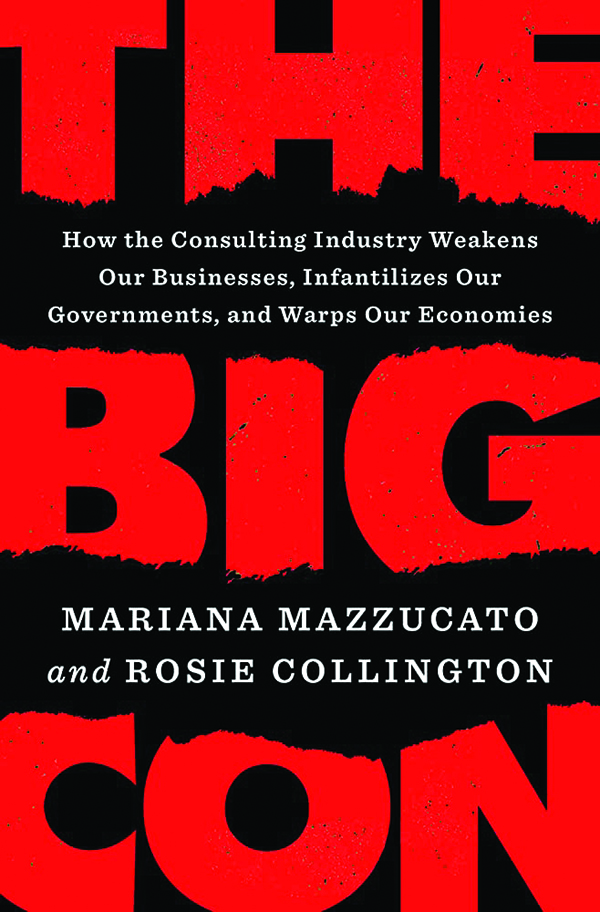
Consulting ourselves to death
Geoff Shullenberger
During the final years of the Obama administration, I was teaching at a large private university where the nascent “great awokening” had made itself manifest in a few incidents of student protest and unrest. There was never a major blowup of the sort seen around the same time at colleges from Yale to Evergreen to the University of Missouri. Nonetheless, administrators felt the need to “do something.”

A task force on “diversity, equity, and inclusion” was duly convened to figure out exactly what. One of this committee’s major moves was to contract a consulting firm to conduct a “climate assessment” of the entire institution. In effect, this was a long online survey that all employees and students were encouraged, cajoled, and bribed (with pizza and the like) into filling out over the course of some months. The survey asked respondents to translate their feelings of comfort and discomfort within the institution into a series of numerical ratings. The consultants then synthesized the resulting data into a public presentation; this glorified PowerPoint was ceremoniously presented as the crowning achievement of the DEI task force — soon after which it was summarily disbanded.
Those skeptical of higher ed DEI initiatives would find plenty to mock in this sequence of events, but their “woke” antagonists might have their own objections. What had started with spontaneous expressions of student discontent, wherever one might stand on the substance of these complaints, had ended with a barrage of bureaucratic abstraction. One of the major outcomes of it all, inevitably, was the expansion of the DEI apparatus — which would go on to hire more consultants for similar projects.
Why did those leading the university see hiring an external consultancy as the obvious and necessary response to the students’ objections? And why did most community members accept this approach without any questions? The answer, as Mariana Mazzucato and Rosie Collington suggest in their new book, The Big Con, is that we live under the sway of “consultology.” This is their shorthand for the cluster of assumptions and practices that inform the vast and powerful consulting industry, which has become a defining element of our professional lives, economy, and governance structures.
As a result, the society we live in may aptly be described as a “consultocracy.” Not only nonprofit educational institutions but Fortune 500 corporations, nongovernmental organizations, and government agencies all regularly undergo processes like the one described above. When those leading such organizations find themselves confronting some novel situation — be it internal unrest, a pandemic, declining market share, rapid technological change, or any number of other eventualities — they turn, by ingrained second nature, to external management consultancies and lay out significant sums for their coveted guidance.
How did this approach become the default one? Do management consultants actually contribute the value to organizations that their growth in recent decades would suggest? These are some of the questions The Big Con sets out to answer. Another question is how this omnipresent industry has remained in the shadows despite having left its mark on nearly every organization in Western societies over decades. These questions are closely related because, as it turns out, the success of consulting has depended partly on the industry’s capacity to avoid public scrutiny and duck accountability for its often dubious contributions to the management of firms and governments.
The Big Con shares its title with David Maurer’s classic 1940 sociological study of confidence tricksters (the inspiration for the classic film The Sting). It’s a bold allegation, but Mazzucato and Collington articulate their j’accuse with precision. The basic modus operandi of consultancies is not “ownership of scarce valuable knowledge assets” but rather “the possession of the means to create an impression of value.” Put simply, consultancies subsist not by actually making demonstrable positive contributions to the functioning of organizations but by conjuring up the appearance they are doing so. The implication here is not simply that executives have somehow become gullible, they clarify. Rather, “the practices of the consulting industry … combine with the broader structures of our political economy to extract rents from clients” — “rents” here referring to the “difference between the value they create and the wealth they take.”
The 22-year-old college graduate brought in to “consult” in an organization with veteran staff, all on the strength of an Ivy League degree and some vague hype about cutting-edge ideas, has become a somewhat familiar object of ridicule. But even when consultants with genuine expertise are brought in, the question Mazzucato and Collington force their readers to ask is: What do organizations gain from bringing in external talent on short-term contracts rather than cultivating it internally? The basic pitch of the industry, they show, is that “learning … can be bought off the shelf, rather than developed over time through cumulative resource and knowledge investments.” The result is that the “Big Con is preventing governments and businesses from evolving the capabilities they need,” leaving them infantilized and dysfunctional — all of which makes continued dependence on consultancies inevitable.
How a political economy so favorable to the consulting industry came into being is a complicated story, but The Big Con implicates in particular the influence of “Third Way” center-left governments such as Tony Blair’s in the United Kingdom and Bill Clinton’s in the United States. In the wake of the midcentury expansion of the regulatory state and public programs, the Thatcher-Reagan revolution had castigated big government and attempted to limit its scope and functions (with less success than often imagined). Figures like Blair and Clinton offered a compromise: a “vision of government,” Mazzucato and Collington write, “as responsible for meeting public needs without necessarily providing public services itself.” Consulting firms played a massive role in implementing this vision, both offering guidance to governments on how to shrink payrolls and enact public-private partnerships and offering their own services on the “private” side of these partnerships.
According to The Big Con, global management consultancy revenue was 10 times greater in 2021 than in 1999 — without much to show for it except a massive financial crisis, secular stagnation, and mounting institutional crises across the West. If center-left leaders deserve a share of the blame for the exploding investment in these dubious operations, so do those on the free market right who have tended to regard waste, inefficiency, and rent-seeking largely as problems of the public sector that more dynamic private organizations can remedy. “The ubiquity of management consultants,” Mazzucato and Collington write, “represents a challenge for democracy [because] most people do not know they are there.”
Mazzucato and Collington are left-of-center economists who avowedly favor the restoration of state capacity and public investment eroded by free market and Third Way economic reforms. But their analysis should be of interest to many who do not share their progressive politics — particularly for the light it sheds on the rise of so-called woke capital, which occurred precisely in the first decades of the 21st century, as consulting revenues were skyrocketing. The major consultancies have played a role in creating practically everything that falls under this heading, from DEI to environmental, social, and governance criteria in investing. “The consulting industry,” the authors write, “has been a key supplier of ESG frameworks and related services.”
The penultimate chapter of The Big Con is dedicated to perhaps the most significant alignment of consulting firms with a progressive political cause: the rise of “climate consulting.” The market for this once-small field of consulting is expected to grow to more than $8.5 billion by 2028. In a remarkable passage, the authors explain why:
“Two key features of the climate crisis render it an even safer bet for consultancies in search of future profits. For one, the climate crisis is not going anywhere any time soon. It is not a business fad or a government reform that will be replaced with the next round of restructuring or elections. It is also not confined to a particular geography or sector; the climate crisis is systemic and affects everything, everywhere.”
It’s worth noting you could easily replace the phrase “climate crisis” in this passage with “systemic racism,” “toxic masculinity,” “gender disparities,” “pandemics,” or any number of other causes taken up by the political Left in recent years — all of which, as it happens, have offered opportunities for consultants to cash in, whether specialized in DEI, ESG, or public health. Although Mazzucato and Collington do not say so, there is a clear symbiosis between progressive invocations of perpetual, pervasive crisis and the consulting industry’s capacity to expand the demand for its services. Those concerned with making sense of “woke capital” would do well to take their polemic seriously.
Geoff Shullenberger is a writer and academic. He blogs at outsidertheory.com. Follow him on Twitter @daily_barbarian.
